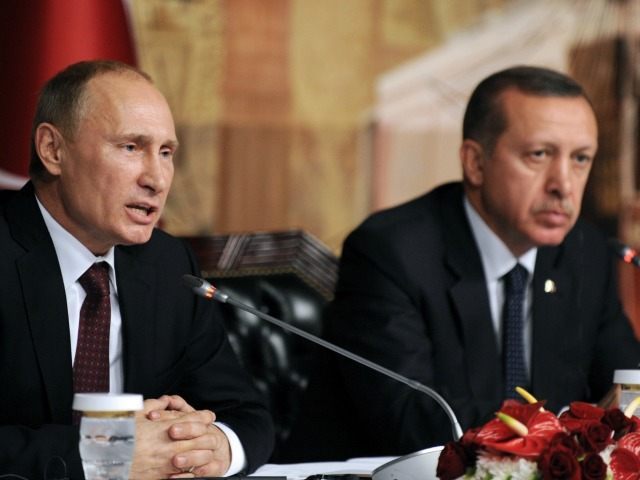Turkish President Recep Tayyip Erdogan is on his first trip abroad since last month’s aborted coup attempt for a scheduled Tuesday meeting with Russian President Vladimir Putin in Moscow.
The relationship between Turkey and Russia was sorely tested by Turkey’s downing of a Russian warplane along the Syrian border in November, but the Wall Street Journal notes Erdogan and Putin have good reasons to patch things up, including economic woes and mutual tensions with the United States.
While Turkish officials portrayed Erdogan’s trip as more of a business meeting, the Journal quotes Istanbul-based analyst Sinan Ulgen on Erdogan’s desire to “send a message to the U.S. and European Union,” which have not been nearly as sympathetic to Erdogan after the coup as Turkey’s president would like.
He is especially vexed by Western powers lecturing him on human rights and authoritarianism while he cracks down on coup plotters (a definition that appears to include a large portion of the Turkish military, civil service, media, and educational establishment) and by America’s reluctance to hand over the man he blames for masterminding the coup, exiled cleric Fethullah Gulen.
“Turkey could indeed go in a more anti-West direction by seeking now to accelerate the normalization and eventual rapprochement with Russia. So there is a real signal Erdogan is trying to give beyond the concrete talks on trade, energy and Syria,” said Ulgen.
The Associated Press notes that Russia was one of the first countries to condemn the coup in July. “We thank the Russian authorities, particularly President Putin. We have received unconditional support from Russia, unlike other countries,” Turkish Foreign Minister Mevlut Cavusoglu peevishly announced at the time.
Some analysts believe Turkey is not likely to pivot completely to Russia and give up on NATO or the European Union, in part because of Russia’s longstanding support for Kurdish separatists in Turkey and its support for the Assad regime in Syria, which Turkey despises. At present, Turkey’s demand for the overthrow of Assad seems irreconcilable with Moscow’s support for the dictator.
(That might change if Putin sells Erdogan on the idea that Syria is a done deal and Assad isn’t going anywhere, so there’s no point in dwelling on what might have been. Also, it would shake things up if Putin convinced Erdogan that his Kurdish problems would be lessened if the Syrian civil war winds down, as Moscow wishes.)
Also, the Russians appear determined to take their time lifting sanctions on Turkey’s tourism industry, imposed after the Russian fighter was shot down. There is a general consensus among observers that Turkey underestimated how much it would lose during its economic standoff with Russia.
On the other hand, the AP quotes Carnegie Europe visiting scholar Marc Pierini suggesting that Russia might “go for a long-term game-changing move and lure Turkey away from the West as part of a broader geopolitical reconfiguration.”
Pierini noted that not only was Vladimir Putin serenely untroubled by the sort of authoritarian crackdown Erdogan is currently prosecuting, he might see it as a useful demonstration of “the Russian style of muscular governance,” leading to “an opportunistic convergence of minds” between the Russian and Turkish strongmen.
Radio Free Europe notes that over the past few weeks, Erdogan has been referring to Putin as a personal “friend,” while Russian officials have been speaking of the Turks as “partners,” a far cry from the brink-of-war rhetoric that was flying between the two nations last winter.
RFE points out a rather dramatic sign of how badly Ankara wants to patch things up with Moscow: Erdogan has actually accused the Turkish pilots who shot down Russia’s Su-24 in November of being part of the coup plot against him.
Russia, meanwhile has compared the coup plot against Erdogan to the Euromaidan protests that forced Moscow’s man Viktork Yanukovych out of power in Ukraine in 2014. The details of a Russia-Turkey alliance have yet to be hammered out, but a certain common worldview seems to be emerging.

COMMENTS
Please let us know if you're having issues with commenting.